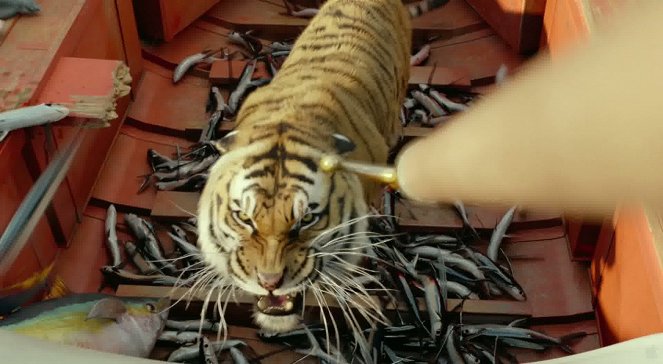Rendező:
Ang LeeForgatókönyvíró:
David MageeOperatőr:
Claudio MirandaZeneszerző:
Mychael DannaSzereplők:
Suraj Sharma, Irrfan Khan, Adil Hussain, Tabu, Gérard Depardieu, Rafe Spall, Andrea Di Stefano, Chien-wei Huang, James Saito, I-Chen KoStreaming (3)
Tartalmak(1)
Pi Patel élete semmiben sem hétköznapi. Egy francia uszodáról kapta a nevét. Az apjának állatkertje van Pondicherryben. Tizennégy évesen hűtlen lesz gyökereihez, hogy egyszerre próbáljon keresztény, mohamedán és hindu lenni. És 227 napot tölt egy mentőcsónakban a Csendes óceánon kettesben egy Richard Parker nevű bengáli tigrissel. (InterCom)
(több)Videók (20)
Recenziók (10)
Colours, animals and gods in a pleasant adventure, and a twist that can be considered nice or nasty, depending on your nature. I reckon the book version was sharper and Ang Lee probably blunted the edges, but it doesn’t matter. Great filmmaking that the ending prevents from being a mere naive religious tale. Thumbs up.
()
I rate this movie five stars for one simple reason. I liked it mostly because it is able to stay on top of all the big religions of the world. It’s kind of a big philosophical view on humans and animals and the world around them. It was really nice to watch and it was even nicer to experience it with Pi, as he was played by a great actor and Ang Lee as an incredibly likeable director added a beautiful, positive and unique atmosphere full of original ideas that you simply have to appreciate.
()
People like to look for a noble, spiritual dimension in suffering. I suffered like a hyena for two hours, but I didn't find any such dimension (although "my mother is an orangutan" at least brought a wicked laugh to my lips). Objectively, it's very nicely colored, smooth and cleverly told, but I always prefer the adrenaline and animality of 127 Hours over the spiritual Circus Humberto. Perhaps one of the 33 million gods who spiritually sponsor this film will not send me on a ship with Suraj Sharma. Because at the moment I want to kill him.
()
A raw, uncompromising, unadorned condemnation of faith as a crutch. That is what the book is about. But not here in this illustrative adaptation which waters down the material into a suitable form for family viewing, turning it into an enchanting tale about faith. It’s simply a Persian pussy-cat kitten and not a full-grown Bengal tiger. All of the rawness (and so the chilling power that is the basis of this story) is gone; from the feeding to leaving out the part where he meets the blind sailor. The result of this is that the (stupidly put across) “Disney-like" adapted version of the lesson barely makes sense and provokes the wrong questions. Apart from this “detail", Lee handled this challenging material with flying colors. Especially once they get to the open sea, he excels, not only in terms of visuals. In terms of filmmaking, he is often impossible to beat; headed the best visual effect in cinema history - Richard Parker. Too bad for the nothing prolog and awful ending. P.S.: The dubbing is pure Hell on Earth. It’s the worst I have heard in a long time and the people responsible should be driven into the tiger enclosure at feeding time. On the other hand, the 3D was a pleasant surprise, used here unexpectedly ingeniously and sensibly, not just for effect.
()
For the first time in a long time, I found it very difficult to find in a film flash of value added, a release from stultifying intellectual dullness. Because it’s seriously not enough that this Lif of Pi is in colour and 3D. The book is not an intellectual masterpiece either, but at least it leaves a lot more room for our imagination and does not immediately cut dead the offer of an alternative interpretation by using an idiotic summary of which animal represented whom. Compared to the film with its single narrator, the book is also more distinctly structured as a contemplation of the reliability of storytelling, on the infinite adaptability of “our” stories (3.14...). In the book, we are encouraged to exercise greater caution in our judgment if we get from a given person only information that fits their version of the story. The beginning of the book, when Pi prepares the groundwork for what he will tell later, thus makes much more sense than in the film, where the beginning is basically used only to present the multiplicity of paths to higher knowledge (including ordinary earthly love, which is absent in the book and which gives the film an unnecessary melodramatic aspect). Whereas there are several narrators in the book and each of them can pursue their respective goals, e.g. “you will believe in God”, the film lets Piscine do all of the talking and thus leads us to a “religious” interpretation, which is further supported by the unambiguous, magical-realistic visual aspect. While reading the book, which doesn’t skimp on descriptions of the brutalities that man commits against animals in the interest of survival, my head was definitely not inundated with so many colours. The absolutely most powerful moment of the film is fittingly its most visually pure, when Pi merely retells the second version in words and it is up to us to imagine it in colour. Though other scenes (the sinking of the ship, the initial confrontation with Richard) are breathtaking in their execution – long shots, the rocking camera that stays in close proximity to the protagonist – they seem uneven and don’t resonate. In the end, the film offers mainly a visceral experience rather than intellectual or emotional enrichment, which is simply not enough, and the painfully high price of a 3D movie ticket doesn’t help. 65%
()
Galéria (73)
Photo © 20th Century Fox



Hirdetés